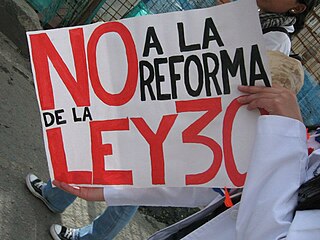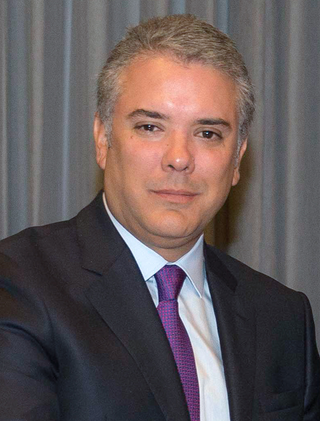Related Research Articles

Alfonso López Michelsen was a Colombian politician and lawyer who served as the 24th President of Colombia from 1974 to 1978. He was nicknamed "El Pollo", a popular Colombian idiom for people with precocious careers.
The Teachers' Federation of Puerto Rico is a trade union federation of teachers in Puerto Rico. With currently 32,000 members, it is one of the most important non-US-aligned unions in the territory. Its primary base is among employees of the Puerto Rico Department of Education.

The 2006 student protests in Chile were a series of ongoing student voice protests carried out by high school students across Chile against the privatization of the Chilean education system, implemented by dictator Augusto Pinochet in the 1970's. The protests peaked on May 30, when 790,000 students adhered to strikes and protests throughout the country, becoming Chile's largest student demonstration in three decades and the first political crisis of president Michelle Bachelet's administration.
The 2010–2011 University of Puerto Rico strikes (UPR) refer to the student strikes which took place between May 2010 and June 2010 in ten of the university system's eleven constituent institutions, as well as the protests that occurred from October 2010 to February 2011.

The 2011 Colombian student protests consisted of a series of demonstrations led by students, some teachers, university employees, and unions, starting on October 12. These demonstrations took place throughout the Colombian territory in protest against the draft of the Higher Education Reform Project presented by the National Government to the Congress of the Republic in October 2011.
Quebradona is a Colombian copper mining venture in Jericó, Antioquia. It commenced in 2002, and is operated by South African multinational company AngloGold Ashanti.

Iván Duque Márquez is a Colombian politician and lawyer who served as the president of Colombia from 2018 to 2022. He was elected as the candidate from the Democratic Centre Party in the 2018 Colombian presidential election. Backed by his mentor, former president and powerful senator Álvaro Uribe, he was elected despite having been relatively unknown a year before the election. He ran on a platform that included opposing Juan Manuel Santos' peace agreement with the FARC guerrilla group. After Duque's term came to an end, he was succeeded by Gustavo Petro on 7 August 2022, after Petro won the runoff round in the 2022 Colombian presidential election.

The 2019–2020 Colombian protests were a collection of protests that began on 21 November 2019. Hundreds of thousands of Colombians demonstrated for various reasons. Some protested against income inequality, corruption, police brutality and various proposed economic and political reforms proposed by the government of Iván Duque Márquez, others against the few violent protestors and in favor of the Colombian peace process.
The 2013 Colombian coffee growers strike was a cessation of activities of the Colombian coffee economic sector, carried out with the realization of different mobilizations in several municipalities of the country, and consequently, the blocking of roads and riots between peasants and the Mobile Anti-Disturbance Squadron (ESMAD). The strike began on 25 February 2013, and on 2 March, despite reaching agreements between the government and the representatives of the coffee growers, the strike continued. Finally, on the 8th of the same month, the parties reached an agreement, through which improvements will be recognized to the exercise of coffee growing, and therefore, the end of the strike.
The student mobilisation of 2001 corresponds to the first phenomenon of notorious participation and demonstrations led by high school students in Chile after the transition to democracy. These brief and limited demonstrations protested against the decline in benefits to school education, such as subsidised transportation fees.

A series of protests began in Colombia on 28 April 2021 against increased taxes, corruption, and health care reform proposed by the government of President Iván Duque. The tax initiative was introduced to expand funding to Ingreso Solidario, a universal basic income social program established in April 2020 to provide relief during the COVID-19 pandemic in Colombia, while the legislative Bill 010 proposed several changes in the health care system in Colombia.

Edgar Pary Chambi is a Bolivian politician and university professor serving as minister of education since 2021. A member of the Movement for Socialism, he previously served as the general director of higher education, technological, linguistic, and artistic techniques within the Ministry of Education and was the department director of education in Potosí from 2011 to 2012.

Gloria Inés Ramírez Rios is a Colombian politician, teacher and trade unionist, member of the Colombian Communist Party. Since 11 August 2022, she has held the position of Minister of Labour of her country, in the government of Gustavo Petro.

Iván Duque's term as the 33rd president of Colombia began with his inauguration on August 7, 2018, and ended on August 7, 2022. Duque a right-wing leader from Bogotá, D.C., took office after a narrow victory over the incumbent left-wing leader of Human Colombia. Gustavo Petro in the 2018 presidential election. Duque was succeeded by leftist leader Gustavo Petro, who won the 2022 presidential election.

Colombian Argentines are Argentine citizens of partial or full Colombian descent, or Colombian citizens who have migrated to and settled in Argentina. As of 2023, there were 119,000 Colombians living in Argentina, most of whom migrated during the 2010s.
This is a broad timeline of the 2022–2023 Peruvian protests against the government of Dina Boluarte and the Congress of Peru, sparked by the self-coup attempt of President Pedro Castillo, who was later arrested for his actions. The protests were organized by social organizations and indigenous peoples who felt they experienced political disenfranchisement, specifically on the politically left-wing to far left, with the groups demanding immediate general elections and a constituent assembly to draft a new Constitution of Peru.

A million voices against the FARC, also called the February 4 march was a name of several civic mobilizations in different parts of the world under the slogan Colombia soy yo that took place on February 4, 2008, in which they protested against the actions of the FARC. These mobilizations arose in January 2008 from the social network Facebook where a group of users was created in reaction to the situation of the hostages evidenced in the survival tests delivered by the guerrilla group in December 2007 and the failure of Operation Emmanuel. This Facebook group grew exponentially in the first weeks of 2008 since it was the only one that at that time referred to those events that generated strong feelings of rejection in Colombia.

Luis Carlos Rúa Sánchez is a Colombian programmer, educator, and human rights defender as well as legislative adviser in the Congress of Colombia. He is known for managing the completion of public works that have been dropped by the Colombian state.

Sidssy Paolin Luz María Uribe Vásquez, also known as Sidssy Uribe and mononymously as Sidssy, is a Colombian plastic artist and human rights activist. Currently, she serves as a state crime victims defender. In 2024, she was a candidate for the Pereira city council as part of the Independientes party.
References
- ↑ Semana (2018-10-09). "Paro estudiantil: las universidades públicas, cortas de recursos". Semana.com Últimas Noticias de Colombia y el Mundo (in Spanish). Archived from the original on 2021-01-22. Retrieved 2021-01-16.
- ↑ "Un mes de marchas universitarias en 12 claves". ELESPECTADOR.COM (in Spanish). 2018-11-15. Archived from the original on 2021-01-22. Retrieved 2021-01-16.
- ↑ "¿Vendrá un paro nacional universitario o una muerte anunciada?". Las2orillas (in Spanish). 2018-10-03. Archived from the original on 2020-06-07. Retrieved 2021-01-16.
- ↑ Canal 1 (2018-10-11). "Tras marcha estudiantil, inicia paro nacional de universidades públicas". Canal 1 (in Spanish). Archived from the original on 2020-06-06. Retrieved 2021-01-16.
{{cite web}}: CS1 maint: numeric names: authors list (link) - ↑ Tiempo, Casa Editorial El (2018-10-29). "Marcha estudiantil 'zombie' el 31 de octubre para pedir más recursos". El Tiempo (in Spanish). Archived from the original on 2018-11-07. Retrieved 2021-01-16.
- ↑ Semana (2018-12-13). "La última marcha estudiantil y los 6,2 billones que han logrado para la educación". Semana.com Últimas Noticias de Colombia y el Mundo (in Spanish). Archived from the original on 2021-01-23. Retrieved 2021-01-16.
- ↑ "Gobierno y líderes universitarios logran acuerdo para levantar el paro estudiantil". Noticias Caracol (in Spanish). 2018-12-14. Archived from the original on 2021-01-22. Retrieved 2021-01-16.
- ↑ "Esteban Mosquera, símbolo de la lucha estudiantil". www.elcolombiano.com (in European Spanish). 2018-12-14. Archived from the original on 2021-01-18. Retrieved 2021-01-16.
- ↑ Herrera, María Esperanza Arias. "Esto fue lo que lograron los estudiantes con el paro de dos meses". Publimetro Colombia (in Spanish). Archived from the original on 2021-01-27. Retrieved 2021-01-16.
- ↑ Aula & Palabra (2018-10-08). "El ABC sobre la crisis de la educación superior en Colombia" (in European Spanish). Archived from the original on 2020-10-03. Retrieved 2021-01-16.